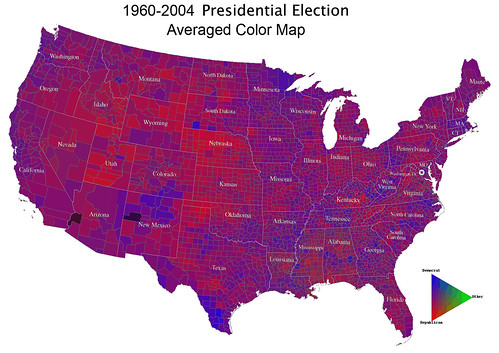Everyone's always telling us: "Vote!" "Exercise your right to choose." "Rock the vote!" "Get out the vote." Etc.
But when we vote, where exactly does that little slip of paper, butterfly punched ballot, or click of the computer go, and what does it count for?
Most of us know we have an electoral college somehow involved in the presidential election. It comes between our vote, and the person who ends up being president. Lots of people call for the end of the electoral college, but it's still around.
It goes like this: You vote, indicating your choice of candidate, but really you're voting for an
 electoral college person, who then votes for a presidential candidate. Each state gets as many electoral votes as it has representatives in the House, plus its number of senators (which is the same for every state).
electoral college person, who then votes for a presidential candidate. Each state gets as many electoral votes as it has representatives in the House, plus its number of senators (which is the same for every state).Typically the electoral college vote will match that of the popular vote. However, in a few notable cases, it has not - 2000 being the most recent example.
Why not just stick with the popular vote? Here's the trick (there's no short way about it): The number of electoral votes is decided based on the number of Representatives each state has. The number of Representatives is based on population. So the more populous your state, the more electoral college votes it gets, which is why states like California and Pennsylvania are targeted by the candidates.
So what's tricky about that? Well... Most people don't vote - just 54% of people voted in the 2004 presidential election. The demographic least likely to vote is those aged 18 to 24. However, this crowd still counts towards the number of electoral votes the state receives. So even if fewer actual people vote in a large state, they will receive more electoral votes than a smaller state that had a larger turnout. The people who do show up to vote have an unfair advantage - their votes essentially "count more." This works to each parties' advantage in different states.
The other factor at play is the history of the electoral college. Back when it was created, African Americans counted as 3/5s of a person (so ridiculous), and this counted towards the total number of electoral college votes a state received... even though black people did not vote. This method clearly favored those states that had a larger African American population, which was generally the South. The South did not want to give this up.
But why do we still have the electoral college? Most states are "winner take all." This means even if the electoral college votes are close, the candidate who wins (even if by a small margin) gets all the votes. Because each party has certain states it knows it has a majority but obviously not 100% of the electoral votes, they don't want to give up the system and potentially give up winning an entire state versus just part of it. They get to keep all the votes even though they didn't actually win all of them.
Get all that? No? Read it again, and then check out the government's FAQ on the electoral college. If you have a little more time, listen to this Back Story radio program on the electoral college that explained it all to me.
And then tell us - what do you think? Should we put the vote directly in the common woman or man's hands?
Related Posts: Are you making your decision based on looks?; Presidential Election and Free Speech; Passive Electioneering; Presidential Election, Registering to Vote, and the Ballot Questions; Absentee Voting; A biased opinion?
Photo courtesy of bradley_newman.
No comments:
Post a Comment